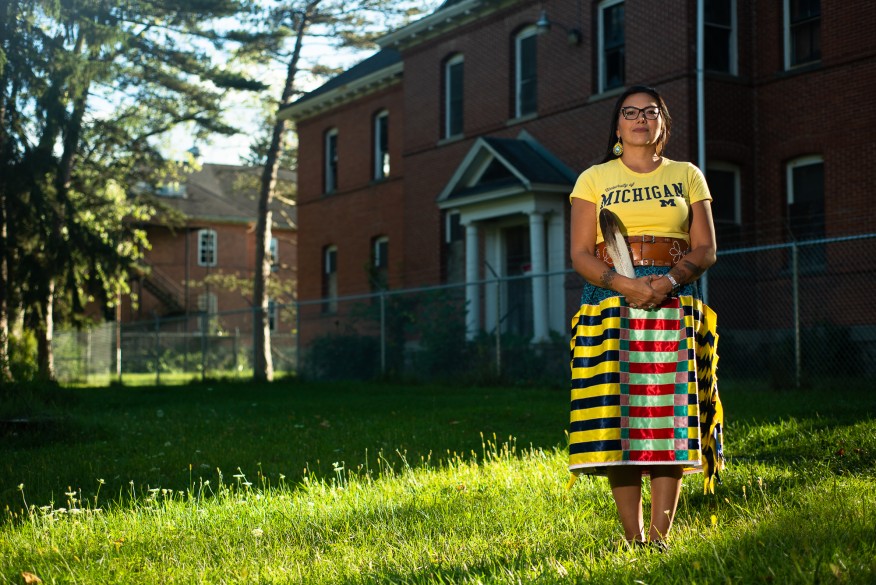-
Pathway:Interpersonal Practice in Integrated Health, Mental Health, & Substance Abuse
What brought you to the U-M School of Social Work?
Heather Syrette: People tend to think you go from high school to your bachelor's to your master's. But like a lot of people of color, I ended up going through some life experiences first. I had the motivation and grades to go to U-M at 18, but my mother was afraid of me leaving home, so I went to a local community college. Then life happened. I got into a relationship and had a child. But school remained a goal. I completed my BSW in 2016 at Central Michigan University, and now, here I am, age 44, with two daughters, completing my MSW.
Are you a first-generation student?
HS: Yes. Due to racism and oppression and other adversities, my parents did not graduate high school. But they instilled it in us to achieve things they couldn't. They have been married almost 50 years. I look at them as an example of what a good family is like. Considering all the oppressions and adversities, we pulled through. You don’t realize adversities in the moment, but now, as a social worker, I do a lot of reflection and forgiveness. I have learned to forgive those who hurt me, and I look instead at the strengths my parents had. I'm very fortunate and very grateful.
Tell us about the history of your tribe.
HS: It’s interesting that you ask. When I started college, there were no land acknowledgments. Now, it is awesome to see a land acknowledgment on emails from U-M, because I am from one of those tribes. My mom's tribe is the Little Traverse Bay Bands of Odawa. My father’s family is Oneida, from New York. Whites drove them west to Ontario and Wisconsin.
As an older student of color what have been your experiences at the School?
HS: My cohort has really taken to my unique perspective. Some professors have never heard an indigenous person's perspective directly, so I speak up when I can, helping them understand and learn more. Native people are still invisible. We have Rez Dogs on Hulu, and the Washington Redskins changed their name. But real progress is not there. So when people hear my perspective, it makes me feel good. The racial issues we talk about in social work all stemmed from colonization.
We only recently have begun to hear about those boarding schools.
HS: In Canada, they found bodies of murdered children on the land of several boarding schools. Students were found buried beneath a boarding school in Harbor Springs, Michigan.
Were members of your family sent to boarding schools?
HS: Yes, my grandfather. I didn't even know until he was in his eighties. His family lived in Pellston, Michigan. He was taken at three years old to a school in Mount Pleasant, 150 miles south. He witnessed and experienced abuse by priests and nuns. His siblings were in the same school, but he couldn’t spend time with them. They were beaten if they spoke their language.
That trauma turned my grandfather abusive. He was an alcoholic for almost 40 years, sharing these stories just recently and telling his children, "I'm sorry."
What would you say are the hot-button issues in your tribal community right now?
HS: Water, land and missing and murdered indigenous people. We have ties to our land that speak to us as a people. I harvest medicine from the land, but it may be poisoned. Nestle is pumping water out of wells near where I live in Mount Pleasant. Then there's oil. There's Line Five that's going through the Straits of Mackinac into Canada, and that affects us. There was a recent spill. The cases of missing and murdered indigenous people have been challenging to resolve because of jurisdictional issues– federal, state and tribal.
Have you encountered any of these issues in your social work career?
HS: Yes. I worked with a family in my community. A woman grew up in a blended family and had a son at a very young age. She was murdered in her own home by a non-Native woman. Her child’s grandmother stepped in, but children of murdered parents don't always have family to care for them.
You mentioned before that you gather medicine. Please tell us about that.
HS: My husband is a traditional healer. We find and harvest different medicines, usually in remote areas. The medicines come from all over Michigan – sweet grass, sage, cedar, etc. They have been here for thousands of years. Even a good percentage of pharmaceutical medications come from plants harvested in Michigan. We use many of these medicines as teas or in other ways. My husband is like a conduit from the spirit world to people here. He interprets how to use those medicines as he works with each individual. We use these medicines as a form of healing and helping ourselves every day.
Will your future career be in one of these areas?
HS: I want to help Native Americans who are struggling with abuse, substance abuse and mental health issues. Much of what Native people struggle with today stems from trauma due to colonization. I plan to continue the work to help and heal Native communities.
